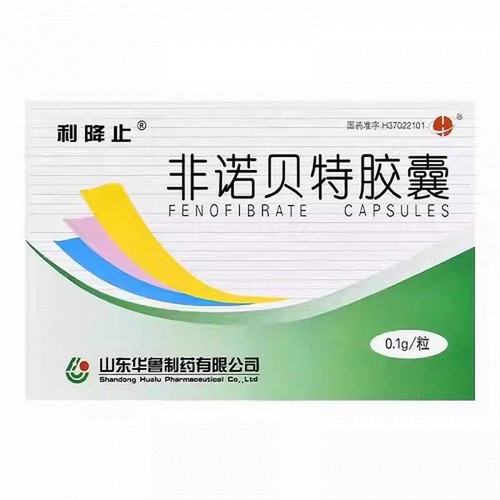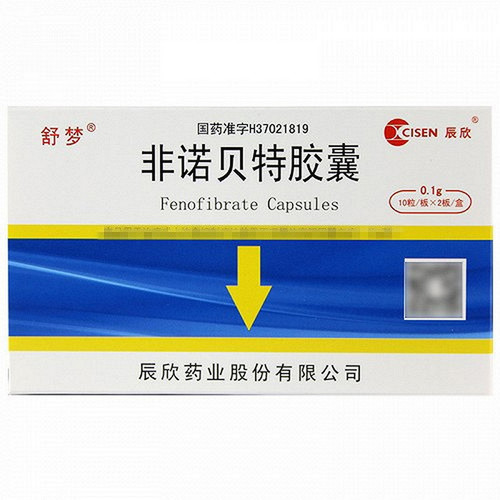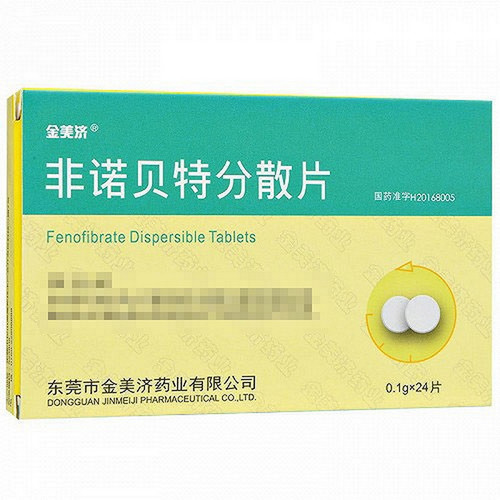Product Overview
[Drug Name]
Generic Name: Fenofibrate Capsules
Trade Name: Han Tang Fenofibrate Capsules 0.1g x 24 capsules
[Main Ingredients]
The active ingredient of this product is fenofibrate.
[Properties]
This product is a capsule containing a white or off-white crystalline powder.
[Indications/Main Functions]
Fenofibrate Capsules are used to treat hyperlipidemia in adults who have not responded well to dietary control therapy. They are more effective in lowering triglycerides and mixed hyperlipidemia than cholesterol. However, this product cannot completely replace dietary control therapy and should only be used as an adjunct to dietary control.
[Specifications]
0.1g x 24 capsules
[Dosage and Administration]
For adults, take orally: 0.1g three times daily, with a maintenance dose of 0.1g once or twice daily. To reduce gastric discomfort, the drug can be taken with food. The dosage should be reduced in patients with renal insufficiency and the elderly. If no effect is seen after two months of treatment, discontinue the drug.
[Adverse Reactions]
The incidence rate is approximately 2%-15%. Gastrointestinal side effects include abdominal discomfort, diarrhea, and constipation, most commonly (approximately 5%); rash (2%); and neurologic adverse reactions include fatigue, headache, loss of libido, impotence, dizziness, and insomnia (approximately 3%-4%). This product, a clofibric acid-based drug, may cause myositis, myopathy, and rhabdomyolysis, leading to elevated blood creatine phosphokinase. Rhabdomyolysis, primarily manifested by myalgia combined with elevated blood creatine phosphokinase and myoglobinuria, can rarely lead to renal failure. The risk of myopathy is increased in patients with nephrotic syndrome and other renal impairment leading to hypoalbuminemia, or in patients with hyperthyroidism (approximately 1%). There is a tendency to increase the incidence of gallstones, potentially leading to gallbladder disease and the need for surgery. Mild to moderate hematologic changes, such as decreased hemoglobin, hematocrit, and white blood cell count, may occur in the early stages of treatment. Rarely, elevated blood aminotransferases, including alanine and aspartate aminotransferase, may also occur.
[Contraindications]
Fenofibrate is contraindicated in patients allergic to fenofibrate. It is also contraindicated in patients with a history of gallbladder disease or cholelithiasis. Fenofibrate capsules can increase cholesterol excretion into bile, potentially causing gallstones. It is also contraindicated in patients with severe renal insufficiency, hepatic insufficiency, primary biliary cirrhosis, or persistent liver dysfunction of unknown cause.
[Precautions]
This product may interfere with diagnosis. Fenofibrate capsules may increase platelet count, blood urea nitrogen, aminotransferases, and serum calcium; and may decrease blood alkaline phosphatase, gamma-glutamyl transpeptidase, and bilirubin. Regular monitoring during treatment should include: ① complete blood count and platelet count; ② liver function tests; ③ blood cholesterol, triglycerides, or low-density lipoprotein cholesterol; and ④ blood creatine phosphokinase. If clinical symptoms suggestive of myopathy (such as myalgia, tenderness, fatigue) or a significant elevation in blood creatine phosphokinase occur, the drug should be discontinued. While treating hyperlipidemia, it's also important to monitor and treat underlying conditions that can cause it, such as hypothyroidism and diabetes. Certain medications, such as estrogens, thiazide diuretics, and beta-blockers, can also cause hyperlipidemia. Once these medications are discontinued, anti-hyperlipidemic treatment is no longer necessary. Dietary therapy remains the primary treatment for hyperlipidemia, and combined with exercise and weight loss, it outperforms any other medication.








